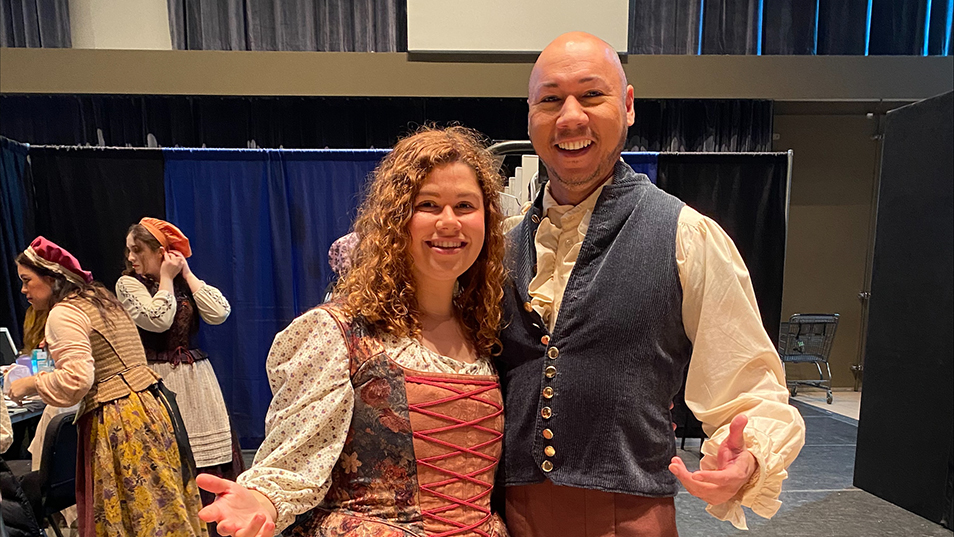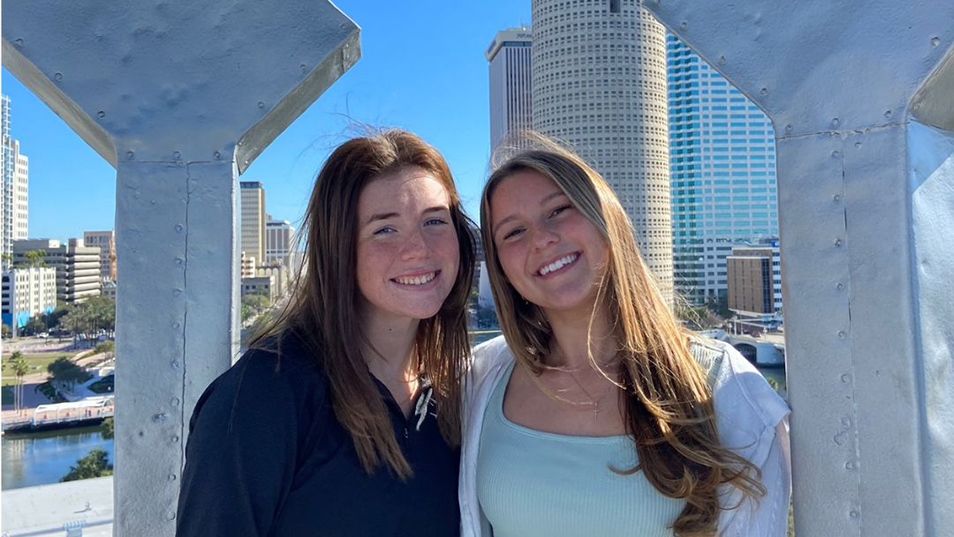Published: June 27, 2019
UT Nursing Students Collaborate with Physicians in Ghana
The smell of the fish. The sounds of foreign voices laughing and bargaining. The hot, dusty wind and the sweat trickling down sticky skin. The joy of a pantomime that leads to cross-cultural understanding. The pride that comes from successfully dressing a wound. And the feel of a child’s hand grasping to be held in friendship.
The UT travel course to Ghana was an awakening of the senses.
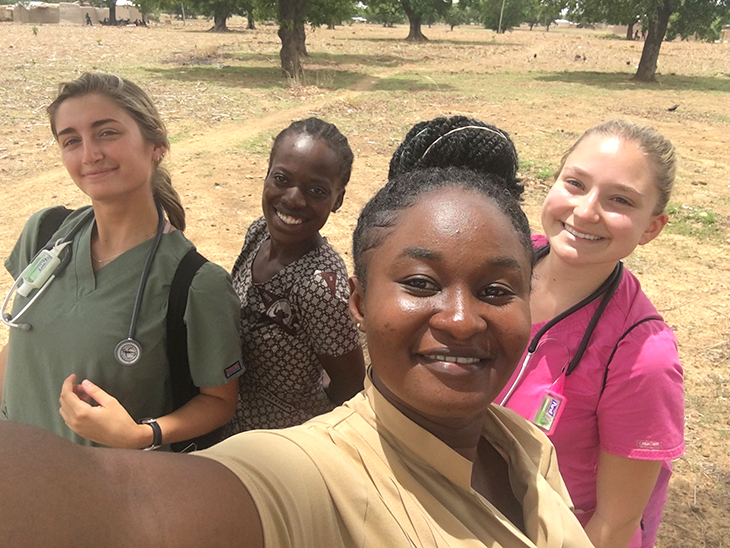
The Spartans went to Ghana for a two-week travel course this May, earning clinical hour credits through hands-on nursing experiences in community health. Photo courtesy of Linzy Canyock ’20
“This trip was so impactful, because it was something I’ve never experienced before. At first it was very overwhelming,” said nursing major Linzy Canyock ’20, who was paired with a female entrepreneur in Kumasi and spent a day shadowing her business in the marketplace. Without a shared common language, there were some challenges. “After the first half where I was a little uncomfortable and overwhelmed, I truly had the best time. It was so cool experiencing what she does for a living. We were fully immersed into the culture.”
The Spartans were in Ghana for a two-week travel course this May, earning clinical hour credits through hands-on nursing experiences in community health. The nursing group, led by Associate Professor Robin White and Assistant Professor Romuald Delacroix, traveled with political scienceProfessor Kevin Fridy’s travel course group, who were analyzing development strategies. Fridy has led trips to Ghana for years and helped connect the nursing students to the communities in Ghana.
The nursing students worked in local clinics and went on home health visits, performing dressing changes, starting IVs, drawing labs, hanging IVs and performing patient care and assessments. As a graduate student in UT’s nurse practitioner program, Brittany Morris MSN ’20 was paired with local physicians and physician assistants, conducting patient consultations with the providers and assisting with assessment, diagnosing and creating treatment plans. She said they saw hundreds of patients of all ages and most commonly treated malaria and typhoid.
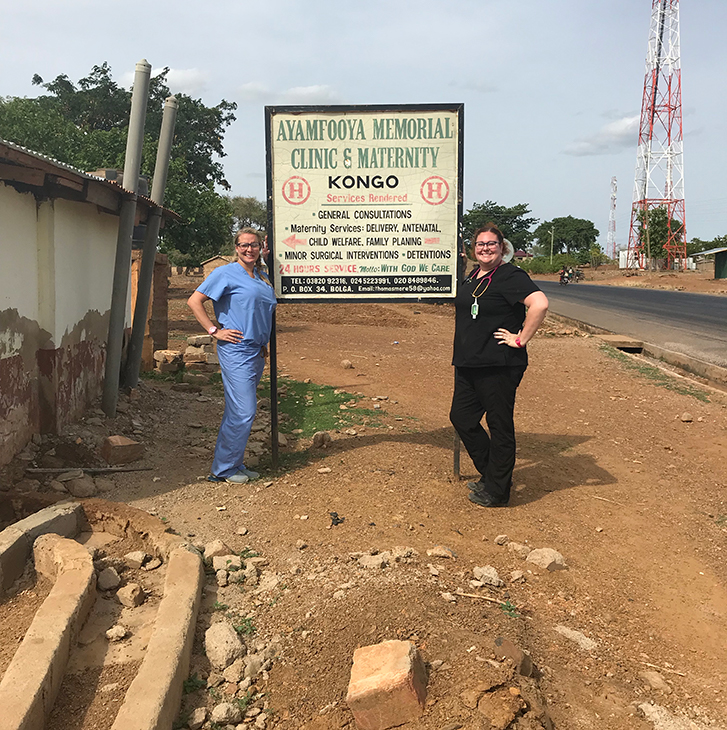
The nursing students were paired with physicians and nursing staff in local clinics. Photo courtesy of Regan Niemann MSN ’20
“I learned so much from a medical perspective by collaborating with the nurses and physicians there. I was overwhelmed and touched by how welcoming and kind the people of Ghana were,” Morris said. “I wasn’t sure how they would feel about American students coming into their towns, homes and very personal visits to the health clinic, but they were so inviting and appreciative. There was such amazing collaboration and mutual respect.”
In the laboratory, the students were able to run tests for malaria, typhoid fever and HIV. For White, who has been practicing nursing for 30 years, it was the first time she had seen typhoid and malaria in the lab.
“It's funny, because in this very small, rural clinic they have the capabilities to run their own labs on site,” White said. “It’s pretty phenomenal when you think about it. They can get the treatment started right away.”
Morris was impressed by the efficiency of the local clinics as well.
“They have an impressive system for treating patients in a timely manner,” Morris said. “The staff members work very hard, long hours to ensure the well-being of the patients — and they do it without some of the medical diagnostic and treatment modalities that we are accustomed to here in the U.S.”
At one point the students were gathered under a tree in a village in an impromptu health seminar. The nursing students spoke with the 50 or so men who had come to ask questions about sexually transmitted infections and other health concerns.
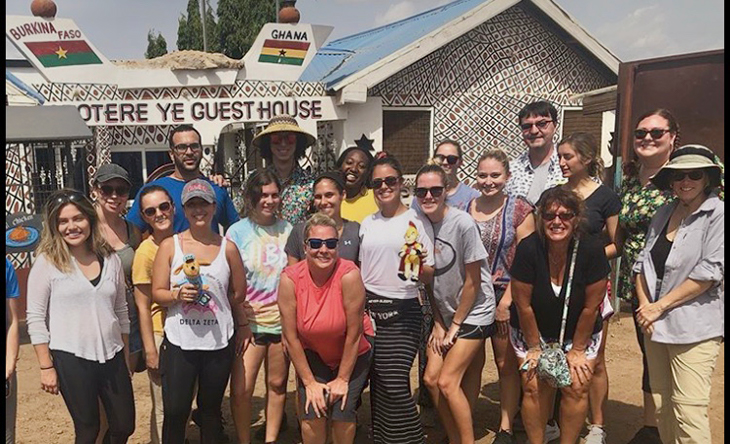
The nursing group travelled with political science Professor Kevin Fridy’s travel course group who were analyzing development strategies. Photo courtesy of Regan Niemann MSN ’20
From a hands-on perspective, the experience is unparalleled for the students.
“I felt as though I was able to grow my skills and become more confident in areas that I don’t get the chance to practice here,” said Calyn Voigt ’20, a nursing major from Plymouth, MN.
In the course of an hour, one student assessed, cleaned and dressed the wounds of 10 patients. That’s as many as she would have done in the course of a year in an American hospital, White said.
“I mean, it was just one after the other after the other after the other, and so it was that repetition that was just fabulous experience for the students,” White said.
Over the course of two weeks, the students traveled from bottom to top of the West African country, even taking a moment to enjoy a safari in Mole National Park where they saw elephants, warthogs, antelope and baboons. But it was the nursing practice, and the cultural exchange, that left the deepest impression.
“This experience has impacted my career goals, because it made me more driven and desired to help people as much as I can,” said Kylie Pezzillo ’20, of Pennington, NJ. “The trip as a whole gave me insight into the type of caring, hardworking and passionate nurse I hope to be.”
Have a story idea? Contact Jamie Pilarczyk, Web Writer
Subscribe to News and UT Life stories
Read more UT Life stories

